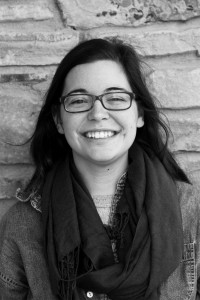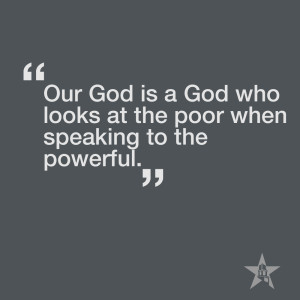Last weekend, I and a group of eleven other Houghton students attended the tenth annual Faith and International Development Conference at Calvin College in Grand Rapids, Michigan. I’ve been thinking for the past month or so about what it means to be graduating with a degree in International Development. International Development is a relatively new area of study which means that there isn’t one established way to think about it or really any major areas of agreement at all. For every issue there are at least three sides, and the literature is filled with vehement arguments. Learning about development entails learning a lot of different ways of looking at the world and evaluating the arguments for each of them.
 The framework used by a lot of Christian development practitioners is known as transformational development; it is the framework typically used by the speakers at FIDC Calvin. Transformational development, as defined by Bryant Myers in Walking with the Poor, looks at poverty as an economic, relational, and spiritual phenomenon, not only present in the lives of those who suffer from resource poverty but in the lives of those who are rich. And I think the transformational development framework should be used by any Christians who are interested in engaging in any way with the world, which should be all Christians.
The framework used by a lot of Christian development practitioners is known as transformational development; it is the framework typically used by the speakers at FIDC Calvin. Transformational development, as defined by Bryant Myers in Walking with the Poor, looks at poverty as an economic, relational, and spiritual phenomenon, not only present in the lives of those who suffer from resource poverty but in the lives of those who are rich. And I think the transformational development framework should be used by any Christians who are interested in engaging in any way with the world, which should be all Christians.
Fundamentally, transformational development is concerned with seeing the world as it really is, not the way we want it to be. The opposite of transformational development is willful blindness to reality for your own benefit. President Mullen, in her chapel message at the beginning of the week, talked about how many of the problems in our world have been caused by the self-deception of those in power. At one point near the beginning of the talk, she said: “…Sooner or later, this pattern of not calling things what they really are stops being a matter of the mind… and starts being a matter of the heart.” Practitioners of transformational development are not simply witnesses to the process but are themselves transformed.
At the conference this past weekend, the theme was “Healthy Humility: Learning to Learn,” particularly from the people whose perspective we typically ignore. One of the best sessions was a devotional by Dr. Ravi Jayakaran, a member of the Lausanne Movement and pioneer of participatory development. His message was taken from the story of Simon the Pharisee and the woman who anointed Jesus’ feet. Jayakaran stressed the importance of being in a posture of orienting ourselves to the marginalized. The passage he referenced in Luke 7 reads that “Jesus looked at the woman and spoke to Simon”.
 This is what we are all called to do as Christians. We are called to be a prophetic voice in society, aligning ourselves with the needs of the marginalized rather than the desires of the powerful. Liberation theology, born out of the experience of the Catholic Church in Latin America, has sometimes been controversial but it emphasizes something that Western Christianity is in danger of missing. One of the key elements in liberation theology is God’s preferential option for the poor—our God is a God who looks at the poor when speaking to the powerful.
This is what we are all called to do as Christians. We are called to be a prophetic voice in society, aligning ourselves with the needs of the marginalized rather than the desires of the powerful. Liberation theology, born out of the experience of the Catholic Church in Latin America, has sometimes been controversial but it emphasizes something that Western Christianity is in danger of missing. One of the key elements in liberation theology is God’s preferential option for the poor—our God is a God who looks at the poor when speaking to the powerful.
I don’t mean to suggest in any way that the international development industry has always or even often aligned itself with the cause of the oppressed. That is unfortunately and sadly untrue—counterexamples are too numerous to number. USAID has a long history of granting aid for reasons of foreign policy that has been used by the elite members of developing societies for their own benefit.
I do think though that at its best a Christian theology of international development has the right view of the world. Listening to the speakers at the conference—Kurt Ver Beek from the Association for a More Just Society in Honduras; Pauline Muchina from the Future African Leaders Project; Scott Sabin from Plant With Purpose; Michael Woolcock from the World Bank—I was inspired by their clear passion for righting injustice whether through environmental interventions, the empowerment of women, or the promotion of a legal system that works for rather than against everyone.
As a graduating senior looking toward the rest of my life, I want to be one of the people that looks to the powerless rather than to the powerful. I want to give preference to the marginalized rather than deference to the celebrated. I want to see the world the way it really is.
“And when the saints go marching in / I want to be one of them”.
